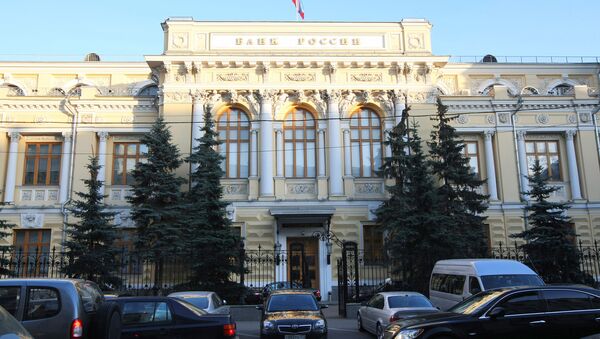MOSCOW, March 21 (RIA Novosti) – Police on Thursday detained 10 opposition activists who briefly blocked an entrance to Russia’s Central Bank building, demanding the repatriation of Russian money stashed away in tax havens abroad, protest organizers and police said.
The 10 activists, who were released within several hours, entered the bank’s headquarters, not far from the Kremlin, blocked an entrance with “chains and handcuffs” and demanded an end to Russian capital flight, tweeted Alexander Averin, a senior member of the unregistered Other Russia party, which organized the protest.
The participants face administrative fines of up to 30,000 rubles (about $970) each for holding an unauthorized event, according to police.
Other Russia, led by radical writer and politician Eduard Limonov, is a successor to the now-banned National Bolshevik Party (NBP) and promotes an ideology of “nationalism and socialism,” Alexander Kurkin, one of the detained protesters, told RIA Novosti by phone from the police station.
One Central Bank employee told the Prime news agency that protesters obstructed passage by those who would not take a leaflet, but overall the bank’s work seemed unaffected by the event.
The party linked Thursday’s protest to the financial crisis embroiling Cyprus’ banks, which have been estimated to hold over $30 billion originating from Russia, and accused President Vladimir Putin of protecting the interests of those “who prefer to keep their money abroad,” according to a statement on its website.
While much of the Russian money in Cypriot banks is believed to be licit, Russia contends with large-scale illegal capital flight, which Central Bank head Sergei Ignatyev said last month amounted to some $49 billion in 2012 alone.
While police have thus far classified Thursday’s incident as an administrative offense, a number of young NBP activists have gotten hefty prison terms for such stunts in the past, most notably in 2004. Seven NBP members were sentenced to between 2½ and five years for marching into the Health Ministry that August, according to the Memorial human rights watchdog. Eight more got jail sentences of 1½ to 3½ years for locking themselves in the presidential administration in December 2004, according to press reports from the following year.


